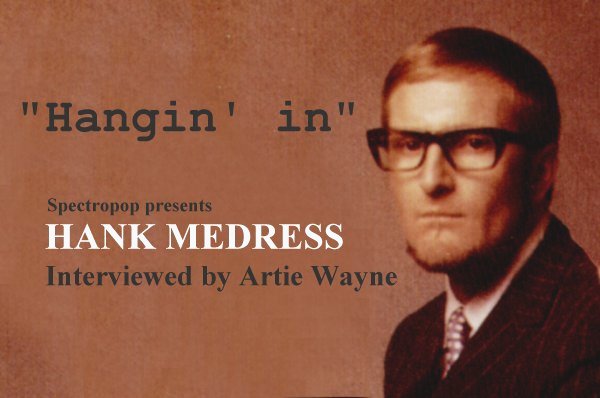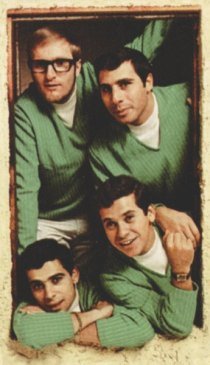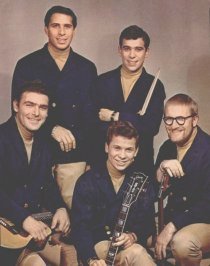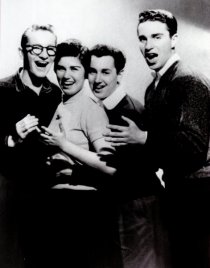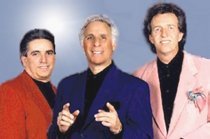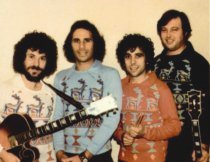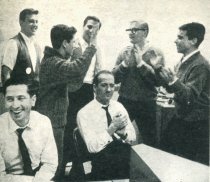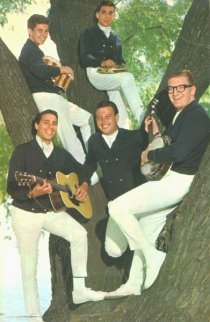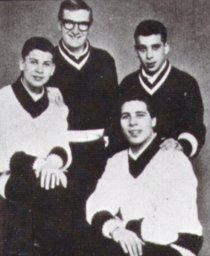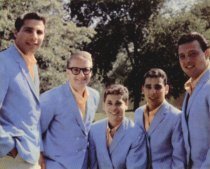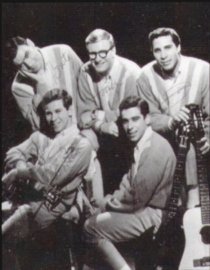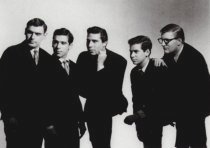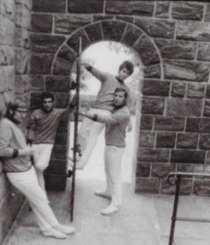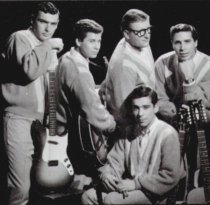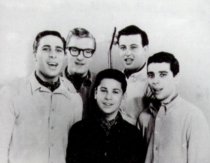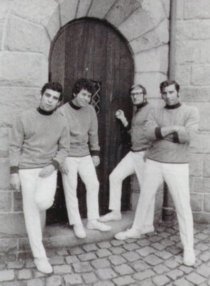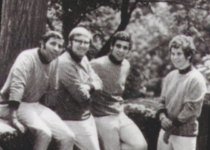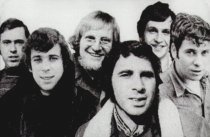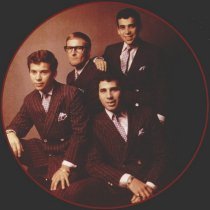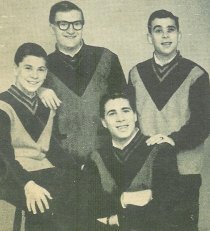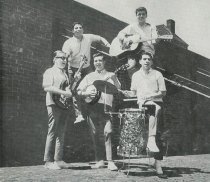|
AW: Hank, how ya doin'?

HM: Hangin' in.

AW: I know what you mean, so let's get on to our interview.
I saw an early publicity picture for your first record on
Warwick Records as the Tokens with a different line-up. Can
you tell us about that?

HM: The original group included Cynthia Zolotin, Eddie
Rabkin and Neil Sedaka. We all went to Lincoln High School
in Brooklyn. A couple of weeks ago I went out to Hollywood,
where the high school alumni association had a dinner to honour
Neil Sedaka. My opening line to Neil was, "50 years to
the day, my life changed when we first met in English class.
Before the class was over, we talked about forming a group."

AW: The Tokens?

HM: No, originally we called ourselves the Linctones -
the Linc is for Lincoln High School. This was back in 1956.
We auditioned for Happy Goday, who in turn set up a meeting
with Morty Craft at Warwick Records. We made a deal and the
first record we put out was 'I Love My Baby', which Neil did
not sing the lead on. Neil, however, was singing 'While I
Dream' on the b-side. The record was a hit in New York, but
Neil wanted to devote more of his time to classical music
and his studies at Juilliard. He also was writing songs with
Howie Greenfield and getting major cover records by LaVern
Baker, the Clovers …

AW: Was he signed to Aldon Music at this time?

HM: Yeah. Donny Kirshner had all the best writers, Goffin
and King, Mann and Weil …

AW: I was signed to Aldon for a while. I didn't have any
hits, but I learned how to write songs from the best! It was
like a school.

HM: It was amazing, really amazing!

AW: Now, how did you get together with Jay, Phil and Mitch?

HM: Well, Neil was starting a solo career, Cynthia and
Eddie just lost interest and disbanded, but I was determined
to get a group together. I knew I had to have a vehicle to
take me where I wanted to go! I knew Jay Siegel from school,
and Neil, who was still halfway in the group, thought Jay
sang great! Then I heard about these two brothers, Phil and
Mitch Margo. I went down to Ocean Parkway to check them out.
Right away we all started writing songs together, which included
'Tonight I Fell In Love'. I borrowed $60 and we made a demo
of the song. I was riding the subway home to Brighton Beach,
some lady overhears me talking about the record we just made,
says she and her son have a record company … they release
it and we have our first hit! On that same session, we recorded
'Wimoweh', before it became 'The Lion Sleeps Tonight'. That
was the song we used to sing on street corners. Jay Siegel
was the one who turned us on to that song. He was a big Pete
Seeger fan and he loved his version of 'Wimoweh'.

AW: And you brought it to Hugo & Luigi at RCA?

HM: We had an audition with them. First we played them
our original songs, but they weren't very interested. Then
they asked if we had anything else? I said there's a song
we sing on the beach. It's a chant and it doesn't have words.
They wanted to hear it. They said, "That's a hit! What
does the lyric mean?" We told them Jay had checked with
the African consulate and it was about a lion hunt, etc. Hugo
and Luigi said they wanted to put a lyric to it. When we came
to the recording session, they handed Jay the lyric as he
was about to go on microphone. Jay changed the melody to make
the lyric fit the meter … and the rest is history!

AW: Weren't you recently in court to claim a share of that
copyright renewal?

HM: We hired lawyers, went back and forth with depositions,
and passionately tried to get the copyright back.

AW: What happened?

HM: Accusations and allegations were being thrown around,
and at one point in the deposition I jumped on the table and
almost beat the shit out of George Weiss [the credited lyric
writer of 'The Lion Sleeps Tonight'] for the things he was
saying! We were already feeling like victims, now we were
being made to feel like criminals! Ultimately, the judge threw
the case out of court because of the statute of limitations,
and also due to the fact that I ended up as president of EMI
Canada. He said I should've been aware when the copyright
renewal came up. He said I should have been reading law journals
and that we waited too long to come forward, and because I
spent my whole life in the music business how could I not
see in Billboard Magazine what was going on? And that's how
we lost the case.

AW: I'm sorry to hear that. You guys obviously contributed
a lot to the creation of 'The Lion Sleeps Tonight', the song
you adapted from 'Wimowheh', but at least you fared better
than Soloman Linda, the black South African who composed 'Wimoweh'
back in the 1930s. He never received a dime of royalties,
and died penniless.

HM: I hear that his estate will be getting a share of
the copyright … a small share, but it's long overdue!

AW: Can you tell us how you found the Chiffons?

HM: After 'The Lion Sleeps Tonight', Capitol Records gave
the Tokens a record production and publishing deal to produce
10 sides, 5 singles. We had an office up there, and they let
us use the conference room.

AW: I remember going up there and playing songs for you
guys! It was like walking into a Marx Brothers movie!

HM: (Laughs) We've been told that before.

AW: How'd you find the Chiffons?

HM: One day the Capitol Records receptionist buzzed me
in my office. She said that there was a group outside with
their manager who wanted an audition, but none of the Capitol
A&R men had time to see them. I told her I'd be happy
to see them. So they came back to my office with their manager,
Ronnie Mack, and sang me a song that he wrote, 'He's So Fine'.
I said, "Oh, my God!" It was one of those times
when you know something is an absolute smash!

AW: Wow!

HM: We already spent our $12,000 budget Capitol gave us
to produce singles, so we went in and recorded it on our demo
budget for the publishing company. We used Capitol Recording
Studios, and it was the first time we ever played our own
instruments on a record. I didn't even know how to play bass!
Johnny Cue, our engineer, suggested that we use "Doo-lang,
doo-lang, doo-lang", the catchy little figure the girls
sing later in the record, in the beginning of the record as
well.

AW: I'll bet all the record companies freaked out over
it!

HM: Artie, CapitoI Records passed on it. Then I went to
every record company in New York City, and everybody turned
me down!

AW: You're kidding?

HM: I started with all the majors - RCA, MCA, Columbia
- then I went to the small labels at 1650 Broadway, the Brill
Building [1619], 1697 Broadway - everybody turned me down!
Finally, I went to a little record company that was off the
beaten track, Laurie Records. I played the record for Bob
and Gene Schwartz. They locked the door and wouldn't let me
out until we made a deal!

AW: Do you remember back in 1968, when we were at MIDEM,
the international music conference in Cannes, France? You
were there with the Tokens and I was there with my first wife,
Sheilah and my partners, Sandy and Kelli Ross

HM: Sure I do! I remember one night in particular, I saw
the Moody Blues perform. On stage there was a symphony orchestra,
which stopped playing when the group came out. The Moody Blues
started singing 'Nights In White Satin' while the guy on keyboard
played this instrument that sounded like a complete symphony
orchestra!

AW: The Mellotron!

HM: Yeah. I bought one! We were the first American group,
even before the Beach Boys, to have one!

AW: I remember when the Musicians' Union in the US banned
it from being used on sessions, because it had the potential
to put a lot of musicians out of work.

HM: After MIDEM we located a Mellotron in England, but
we had to have an English person buy it and send it to us
in the US as a gift, in order to bypass import restrictions.
We kept it under wraps in the studio, took it apart and replaced
rhythm loops like rumbas and cha chas, with other sound samples.
We used it on Brute Force's cult classic, 'The King Of Fu'
[aka 'The Fu King'], which came out on Apple Records after
we made a handshake deal with the Beatles.

AW: Wow, that's some story! But getting back to the night
of the Moody Blues concert, do you remember what happened
after the show?

HM: (Puzzled) No. What?

AW: You, Phil, Sheilah and I were schmoozing in the lobby
when we saw a pickpocket in evening clothes slashing tuxedo
pockets of the guests and stealing wallets. We all just looked
at each other, then we followed this guy for about a half
an hour. After making some remarks to each other out of an
Abbott and Costello movie, Phil found a security guard and
we had the guy arrested. Then you said, "What if he wasn't
working alone?"

HM: (Laughs) No, I don't remember that.

AW: At our age, you don't remember a lotta shit! (Both
laugh) I remember on one of my trips back to New York, I dropped
by to see you at EMI and you introduced me to Buster Poindexter.
You played me a record you just cut with him that's still
one of my favourites, 'Hot, Hot, Hot!'

HM: That's interesting, 'cause 'Hot, Hot, Hot!' became
another one of my earworms.

AW: Earworms?

HM: Yeah, the kinds of songs that come into your head
while you're showering or when you're walking. You don't want
them in your head.

AW: But they're there anyway.

HM: Yeah. I just did an interview for a new TV pilot with
Pete Fornatale, who used to be on WNEW radio, called 'Earworms',
'cause a lot my records - 'The Lion Sleeps Tonight', 'Hot,
Hot, Hot!' and 'Tie A Yellow Ribbon' - fit that description.

AW: Speaking of "Tie A Yellow Ribbon", you have
a pretty long history with Tony Orlando?

HM: We've been friends since the early '60s when Jack
Keller and Brooks Arthur were producing him. Dave Appell,
who was running our publishing company, got a song from Wes
Farrell - 'Candida' by Toni Wine and Irwin Levine. I thought
it was a smash. I wanted Tony to sing lead on it, but he didn't
want to record 'cause he had a job and he didn't want to blow
his marriage! He was working at April-Blackwood Music, and
was afraid he'd lose his job … and his wife, if anyone
found out it was him singing. So we used the group name, Dawn.
Then we had 'Knock Three Times' and we couldn't keep it a
secret any longer!

AW: Tell us the story behind "Tie A Yellow Ribbon".

HM: As we were planning our next recording sessions, I
asked Tony what he wanted to be ultimately in his career?
He said he wanted to be like Bobby Darin, who was his idol,
a Vegas and television personality. I said, "OK".
Then one day this song came in by Larry Brown and Irwin Levine.
Larry could hardly play it on the guitar, and Dave Appell
had to help him figure out the chords. I heard the song on
their guitar/voice demo and said, "That's a number one
record!" I play the song for Tony and he looks at me
like I've gone out of my mind: "You want me to sing a
song about yellow ribbons?" I said, "Do you want
to be like Bobby Darin? If you record this song you'll work
for the rest of your life!" He said he couldn't record
the song - it was embarrassing. So we negotiated and Tony
agreed to do 'Tie A Yellow Ribbon' if I agreed to produce
an aesthetic album with him. Then I played him an Allen Toussaint
song, 'Freedom For The Stallion'.

AW: That's a song Tony Byrne, one of my Warner Raiders,
gave you. As I remember, you also cut Alan O'Day's 'Caress
Me Pretty Music' on the same album.

HM: Wow! Anyway, Tony comes into the studio to record
'Ribbon' with a chip on his shoulder and asks me how he wants
him to sing it. I said do it like Bobby Darin would do it!
He did and, as they say, the rest is history!

AW: I was always impressed with all those commercials you
and the Tokens did!

HM: That's interesting. They certainly kept us alive for
a while - 'Pan Am Makes The Going Great', 'Great Shakes',
(sings) "Any place can be a soda shop" …

AW: Sure!

HM: … 'She Lets Her Hair Down', 'A Silly Millimeter
Longer', '101 Chesterfield Cigarettes'. We were the first
group that Madison Avenue contracted to put the whole package
together - to write, produce and perform. We'd leave the studio
after doing these commercials and wonder why we weren't doing
records with this kind of mentality. We didn't think about
it, we weren't trying to do anything, but maybe have a good
time! It was always a mystery to us, 'cause sometimes the
commercials came out better than our records!

AW: It always was a dream of mine to sing on a record with
you guys. That dream came true when Jerry Ross asked me to
get you to sing background on some songs he was producing
with Keith.

HM: (Lights up) '98.6'! That was a big record!

AW: What other singers have you done backgrounds for?

HM: Chubby Checker, Connie Francis, but mostly we did
them for our own productions.

AW: Do you know that I've never had an appointment with
you? Whenever I wanted to see you to play a song, I'd just
drop by your office and you'd always make time to see me.
Sometimes I had to wait, but you'd always see me, which I
appreciate.

HM: What the business doesn't have for me today is a sense
of urgency. In those days you could hear a great song, the
next day you could be in the studio recording it, and that
night an acetate would be played on WABC! I've done projects
for companies who've given me a ton of money, I spend months
producing the record, but by the time the record's finished,
the person I made the deal with is no longer with the company,
and the record gets lost in the process. That urgency unfortunately
no longer exists.

AW: You're currently working on a project with a real sense
of urgency. Can you tell me about Sound Exchange? *

HM: I locate and contact recording artists who are entitled
to royalties that have been collected by Sound Exchange from
digital services, satellite radio and TV, webcasters and digital
cable. You'd be surprised how many people are owed money,
but don't know it!

AW: How do you find out if you're on the list?

HM: Go to our website [details below]. If you're on the
list, then it'll tell you how to collect your money!

AW: I think what you're doing is incredible and obviously
keeps you in a positive frame of mind!

HM: I'm fighting lung cancer, but I'm keeping a positive
attitude. God gives us a way of dealing with things. Every
morning I wake up knowing I have another chance to give something
back.

AW: Hank, I not only want to thank you for this interview,
but for all the joy your music has given the world! Know that
all our prayers and good thoughts are with you and how proud
I am to be your friend.

|
